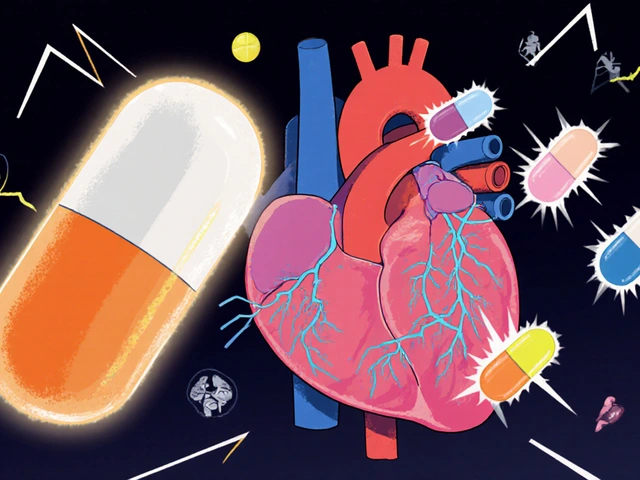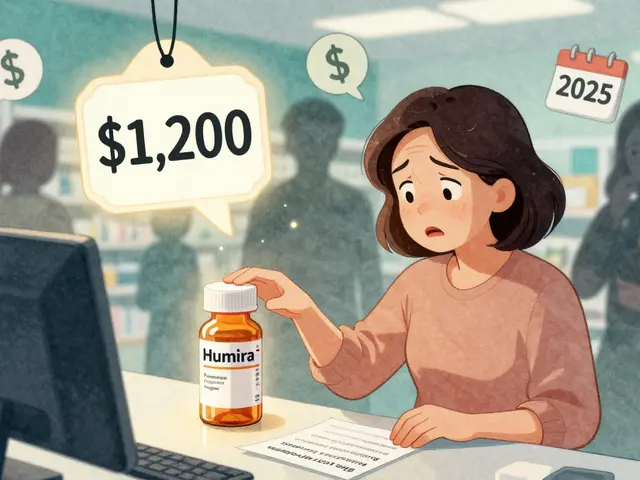
TL;DR
- Decadron is the brand name for dexamethasone, a powerful corticosteroid.
- It’s used for inflammation, allergic reactions, asthma flare‑ups and certain cancers.
- Typical adult doses range from 0.5mg to 10mg daily, depending on the condition.
- Short‑term side effects include mood swings, increased appetite and sleep trouble; long‑term use can raise infection risk and affect bone health.
- Never stop abruptly - taper the dose under medical guidance.
What is Decadron and When Do Doctors Prescribe It?
When you hear the name Decadron, think of a synthetic steroid that mimics the body’s own cortisol. In the medical world it’s called dexamethasone, a high‑potency glucocorticoid that can calm down inflammation fast. That’s why you’ll see it on prescriptions for everything from severe asthma attacks to post‑surgical swelling.
The drug comes in tablets, injectable solutions and even eye‑drops. Because it’s so strong, doctors reserve it for cases where other anti‑inflammatories haven’t cut it. Typical scenarios include:
- Acute allergic reactions that threaten the airway.
- Exacerbations of chronic lung diseases such as COPD or asthma.
- Autoimmune flares like rheumatoid arthritis or lupus.
- Chemotherapy‑induced nausea and certain cancers (e.g., leukemia, lymphoma).
- Brain swelling after injury or surgery.
In short, Decadron is the go‑to when you need a fast, powerful anti‑inflammatory punch.
How Decadron Works and What Conditions It Treats
Decadron binds to glucocorticoid receptors inside cells, switching off genes that produce inflammatory proteins. The result? Less swelling, fewer white‑blood‑cell attacks, and a calmer immune system. Because the effect is systemic, the drug influences many body systems at once.
Here’s a quick look at the most common uses:
- Respiratory emergencies - a single high dose can reduce airway swelling, buying time for other treatments.
- Autoimmune flare‑ups - it halts the immune system’s misguided attack on joints, skin or organs.
- Chemotherapy adjunct - dexamethasone improves the effectiveness of certain chemo drugs and eases nausea.
- Brain edema - after a head injury, steroids shrink the fluid build‑up around the brain.
- Eye conditions - steroid eye‑drops treat severe inflammation after surgery or injury.
Because the drug touches so many pathways, side effects are a real concern. That’s why the dosage and duration matter a lot, which we’ll cover next.

Dosage Guidelines: How to Take Decadron Safely
Getting the dose right is a balancing act. Too little, and you won’t see relief; too much, and you invite trouble. Below are the most common regimens, but always follow your prescriber’s instructions.
Oral tablets - typical adult schedules
- Acute asthma or COPD flare: 4mg to 6mg every 6hours for 2‑3days, then taper.
- Allergic reaction: a single 10mg dose can be enough, followed by observation.
- Rheumatoid arthritis flare: 0.5mg‑1mg daily for up to 2weeks, then taper.
Injectable forms
In hospitals you’ll often see Decadron given IV or IM for quick action. Doses are similar to oral equivalents but administered over minutes.
Children
Pediatric dosing is weight‑based, typically 0.15mg/kg per day, split into two doses. Never give a child an adult dose.
Tapering - why you shouldn’t quit cold turkey
If you’ve been on Decadron for more than a week, your adrenal glands have likely slowed their own cortisol production. Stopping abruptly can cause adrenal insufficiency - a dangerous drop in blood pressure, fatigue, and even shock. A typical taper might look like this:
- Week1: Reduce dose by 10‑20%.
- Week2‑3: Keep cutting 10% each week until you’re down to a physiologic dose (≈0.5mg).
- Final week: Switch to a short‑acting steroid like prednisolone for a few days, then stop.
Always let your doctor design the taper - they’ll consider how long you’ve been on the drug and what condition you’re treating.
Side Effects, Risks & How to Minimize Them
Because Decadron acts on the whole body, a laundry list of side effects can appear. Knowing what to watch for helps you act quickly.
Common, usually short‑term effects
- Increased appetite and weight gain.
- Fluid retention - you might notice puffiness around your ankles.
- Mood swings, anxiety or trouble sleeping.
- Elevated blood sugar - people with diabetes need tighter monitoring.
Serious, long‑term concerns (usually after weeks‑months of use)
- Osteoporosis - steroids thin bone, so calcium and vitaminD become essential.
- Peptic ulcers - take the drug with food, and discuss a proton‑pump inhibitor with your doctor if you’re at risk.
- Increased infection risk - your immune system is dampened, so watch for fevers or unusual bruising.
- Eye problems - cataracts or glaucoma can develop with prolonged use.
- Adrenal suppression - as mentioned, tapering avoids a crash.
Tips to stay on the safe side
- Use the lowest effective dose for the shortest time possible.
- Keep a medication diary - note any new symptoms, even mild ones.
- Schedule regular check‑ups: bone density scans if you’re on steroids for >3months.
- Stay hydrated and maintain a balanced diet rich in potassium and calcium.
- If you’re pregnant or nursing, talk to your GP - dexamethasone does cross the placenta.
When to call a professional
Seek medical help immediately if you experience severe abdominal pain, sudden vision changes, high fever, or unexplained bruising. These could signal ulcers, eye complications, or infection - all red flags when you’re on a steroid.
Quick FAQ
- Can I take Decadron with other steroids? Generally no; stacking steroids raises side‑effect risk.
- Is Decadron addictive? It’s not addictive, but abrupt cessation can cause withdrawal symptoms.
- Do I need to avoid vaccines? Live vaccines (like MMR) are best postponed until you’re off high‑dose steroids.
- Can I drink alcohol? Moderate intake is usually fine, but heavy drinking worsens stomach irritation.
- What about food interactions? Grapefruit juice can increase steroid levels; avoid it while on Decadron.
Understanding how Decadron works, the right way to dose it, and the pitfalls to dodge will empower you to use the medication safely. If anything feels off, reach out to your healthcare provider - better safe than sorry.
14 Comments
Write a comment
More Articles

Cordarone (Amiodarone) vs. Alternatives: What Works Best for Arrhythmias?
Cordarone (amiodarone) is effective for serious heart rhythm disorders but carries serious long-term risks. Learn how alternatives like sotalol, dronedarone, and ablation compare in safety and effectiveness.

How to Manage Medication Costs During Medicare Part D Coverage Gaps in 2024 (Before the Donut Hole Ends)
Learn how to lower prescription drug costs during Medicare Part D's coverage gap (donut hole) in 2024 before it ends. Discover real strategies like manufacturer discounts, generic switches, and Extra Help to avoid financial strain.

Julien Martin
September 21, 2025 AT 00:38Decadron’s mechanism hinges on glucocorticoid receptor modulation, which downregulates pro‑inflammatory transcription factors such as NF‑κB. This pharmacodynamic profile makes it invaluable in acute airway edema and autoimmune exacerbations. When dosing, clinicians typically titrate from 0.5 mg up to 10 mg per day based on disease severity, always aiming for the minimum effective dose. Remember to taper gradually to avoid adrenal insufficiency, especially after more than a week of therapy.